I hope you are well, or at least in better shape than I! Please see me at the hospital in Ihsaan-Waahaan at your earliest convenience, as I have not yet been given clearance by Dr. Ayub to return to work, and there are matters I would discuss with you that cannot wait that long.
Also, I am very terribly bored, and a visitor might improve my spirits considerably. May pity for me hasten your coming if curiosity alone will not.
Yours,
Peter
P.S. If possible, please bring with you any texts that you may have available pertaining to Sanskrit characters and syllables (especially their more esoteric, occult aspects) as well as the symbolism of yantras.
P.P.S. And cigarettes too, if you please.
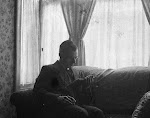
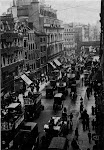
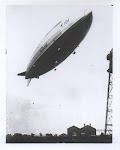
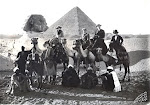

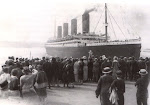


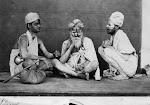


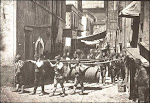


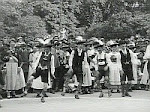
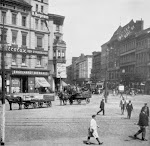
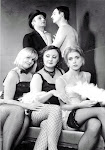
9 comments:
When Irene arrived, she found Peter seated in a wicker chair, writing in his notebook. Upon seeing her, he closed the book and reciprocated her smile, standing up slowly to greet her.
Receiving the cigarettes, he exclaimed, "Irene, you are heaven-sent, truly a life-saver! And you brought books, too, I see! Excellent."
He offered Irene his seat as he retrieved a small box of matches. "No apologies are necessary," he assured her. "You are actually not the first to visit me, but I'll say more on that later. How go things on site? The thieves did not cause too much damage to the artifacts, I hope, nor to you?"
As Irene related that news she cared to share, Peter eagerly removed a cigarette from its tin and, striking a match, brought the delicate cylinder of tobacco to life. An expression of satisfaction and relief danced over his face as he took the smoke in and held it briefly within his lungs. As he exhaled, the narrow stream expanded into a cloud that tinted the sunbeams in the room blueish-grey.
Though it was clear to Irene that Peter had much on his mind (after what he had just been through, who wouldn't?), the ritual of smoking seemed to soothe him and help focus his thoughts into words.
He cleared his throat and began, "As I indicated in my letter, I have not been spending my time here idly. In my waking hours, I have given considerable thought to the attempted burglary, and it seems there are some mysteries for us to solve if we are to effectively thwart any further intrusions; for, having failed in their objective, whoever these thieves represented will almost certainly make another attempt, I fear."
He paused briefly to take another puff on his cigarette. Though Peter was clearly delighted to see Irene, she realized then that he seemed more excited by the prospect of sating his curiosity than by the simple comfort of having company. She had never before seen him quite this animated; clearly, the attack had lit a fire within him, and his use of the word "us" assumed that she would share his interest in getting to the bottom of things.
Exhaling another plume of smoke, Peter continued, "So I have been asking myself: Who were these men? From where did they come? For what were they searching? How is it that our guard Mohan was so strangely and completely incapacitated? And I have been doing some investigating here where and when I can, talking to people and looking for answers but only finding more questions."
Peter picked up his notebook from off the bed and opened it to what appeared from a distance to be an outline of a human form. "I wanted to show this to you," he said, crossing the room and handing the book to Irene, whereupon she could see that the body he had sketched was decorated with peculiar designs.
"Tattoos," he explained. "I copied them from the body of the thief McCormick killed. His companion still lives but, sadly, is in no condition to share any information."
"Look here," he said, pointing to a square containing an eight-petaled lotus, within which was inscribed a six-pointed star as well as various Sanskrit characters. "It is a yantra of some kind, though I do not know its meaning. Hence my request for those books. And these," he added, indicating a series of markings on what must have been the thighs of the thief, "look familiar, do they not?"
Indeed, their resemblance to the lettering on the Pashupati amulet was unmistakable.
"What do you make of it?" Peter asked, drawing again on his cigarette.
Peter stubbed out his cigarette and studied Irene's drawing, which only made the connection between the thieves and Mohenjo-Daro more clear, though no more comprehensible.
"You are no more mad than I," Peter said firmly. "If you were able to decipher the letters on the Pashupati amulet, then this knowledge cannot have materialized out of nothing. I was once told that the human mind is analogous to an iceberg, in that we are aware of only the tip, yet there is much underneath it that cannot be accessed by ordinary means. Perhaps you had been exposed to the script previously, and the forgotten knowledge surfaced only briefly to permit your sudden, inexplicable flash of insight."
He reached for another cigarette and, lighting it, said, "I have more to tell you. Yesterday, I was visited by a Siddhar - a folk-healer - named Ashan. He is an acquaintance of my surgeon, Doctor Ayub, and more familiar than he with the esoterica of these lands and its people. He told me a great deal, and though much of it strains rational belief, I will let you make up your own mind."
"First, he told me that Mohan was likely overcome by a rare, toxic powder that is delivered at close range. Notably, Mohan said the last thing he can remember was feeling the urge to sneeze. This dust, when inhaled, purportedly causes a temporary stupor characterized by obliviousness, paralysis, and amnesia. He has promised to furnish me with an antidote, though when you return to camp you might also share this information with the Major and recommend that his men be outfitted with goggles and keep their mouths and noses covered while on duty, just as a precaution."
"Next, I asked Ashan to have a look at the body of the dead thief. He did not have much to say with regard to the tattoos, but he... ah, examined the, um... private area of the body, the details of which I will spare you. Ayub had diagnosed the man as suffering from advanced syphilis, but Ashan claimed that the thief was actually in transition from male to female."
"Impossible! Yes, yes, I know. But this next tidbit may be more credible: Ashan identified the dead man as a devotee of the ancient guru Laap-Mudr, who, according to legend, 'lost her face' after trying to steal medicines from her husband, Agasthiya. He further said that Agasthiya is another name for Shiva, and is Pashupati not an epithet of Shiva? Surely this is not a coincidence!"
Peter was so engaged with his narrative and the implications therein that he had neglected his cigarette, which by now had smoldered itself into a long, thin ash.
"There is more still. Ashan also examined the surviving thief, and said he was a Thug. A Thug, Irene! Can you imagine? And here I thought we had eradicated that murderous cult decades ago."
Peter paused to look at Irene, as if to gauge her disbelief, and in so doing realized how he sounded to his own ears. "Speaking of madness, you must think me touched, the way Ashan's wild tales have seized my imagination! But I'm curious to hear your thoughts. Does any of what I have related make any sense? Does it comport with your knowledge of the mythology of this place? Perhaps we should consult your books."
"One thing is certain," Peter added, finally minding his cigarette and extinguishing its remains. "That the symbols on the brick and the amulet correspond with the markings on our attackers proves that traces of whatever society first etched them still exist in some form. Moreover, I do not believe that our uninvited visitors were seeking to destroy any of what we have found thus far; for, if annihilation were their objective, there are much more efficient ways of going about it than by smashing a brick on the ground. No, I suspect they were more likely looking for something, perhaps to bring it back to whatever cult or clan had sent them."
The furrows etched in Peter's brow deepened, and his eyes widened as he entertained a truly troubling thought.
"Irene... we had not yet publicized any of our findings. How, then, did these men know what to look for, and where? Do you suppose... that they have an informant in our camp?"
"Doctor Ayub estimated that I would be here for another few days," Peter answered glumly as he returned to his bed and propped himself up with some pillows. Opening the Keith text, he began scanning its index and pages for any reference to Laap-Mudr, Agasthiya, or Pashupati, and fell silent for a long while.
Finally, he looked up from the book and declared, "I think we can trust McCormick, if only because he is a foreigner, like us, and as such is unlikely to be associated with any secretive, nativist sects. Our major obstacle - ha ha - will be convincing him to pay us any heed instead of dismissing our opinions out of hand."
He sighed under the enormity of the challenge. "Unfortunately, it may take another attack on the camp before McCormick is willing to consider that our troubles are larger than a pair of inept burglars, but even then there is no guarantee that he would listen to us."
He continued, "Identifying the informant will be even trickier, I expect, for I know next to nothing of McCormick's men, nor the other members of the archaeology team. But in light of how quickly news travels, I would suggest that, as a matter of policy, we now keep what we find as secret as possible."
"At the risk of sounding paranoid, I would also suggest that we remain watchful for anything out of the ordinary: unusual markings on exposed skin, furtive conversations, or even a sidelong glance that lingers just half a second too long - such minutiae may portend much."
"And," he continued, his blue eyes locking onto Irene's, "if McCormick will not heed our warnings, then it falls to us to do all we can to ensure the success of this enterprise and the safety of those involved."
Peter nodded in affirmation of approaching the Major conjointly. But when Irene suggested that she begin gleaning information on her own, he only looked at her again for a long while, his expression carefully neutral.
Behind those appraising eyes of his, Irene could sense that Peter was made uncomfortable by the prospect of encouraging her to put herself in harm's way; but he must also have acknowledged that, between the two of them, she was plainly the better equipped for this job, and that fact alone served to mute his reservations, though not entirely abolish them.
"You'll need to be armed," was all he said as he returned his attention to the book in his lap.
(Irene passes three library use checks and fails two, passes two Sanskrit checks, fails two anthropology checks, and makes an idea. Peter passes two library use checks and fails three, passes an Urdu check, passes an anthropology check, and makes an idea roll. Information is in your e-mail.)
Peter did not say anything more for a long while, losing himself among the texts Irene had furnished. She had to take his silence for assent, which was truly the best she could hope for under the circumstances; for, despite his conscious attempts to be egalitarian, everything in Peter's traditional upbringing insisted that women were to be protected at all costs - as had been demonstrated by his swift action when Irene was threatened.
However, although Peter may not have been willing to say as much, they both knew that Irene was right. Of the two of them, she was more likely to gain the confidences of the workers at the site, and she had plenty of men around to protect in the event of any danger. At any rate, Peter was powerless to stop her regardless of any misgivings he may have harbored.
Finding nothing on Laap-Mudr, Agasthiya, or Pashupati in the Keith text, he set it aside with a frustrated sigh and turned his attention instead to Nuttenwold in the hopes of deciphering the yantra tattoo. "Lakshmi," he murmured, after a time. "That's what Ashan thought, too. I suppose that might be appropriate for a thief..."
But not entirely convinced, he consulted Barnard to decipher the Sanskrit characters more carefully. After a few minutes of study, he said "A-la..?"
"Alakshmi?"
Peter's eyes lit up in sudden recognition. Springing forth from the bed with as much alacrity as possible for a person in his condition, he took up Indian Mythology again and flipped rapidly through its pages, until...
"Yes!" He exclaimed at his discovery. "Alakshmi! Of course, it makes much more sense! Irene, listen to this!"
He began reading aloud:
Alakshmi: the elder sister of Lakshmi and the Hindoo goddess of misfortune; also the second wife of Kali, the demon portrayed in the Kalki Purana and the Mahabharata, who is the reigning lord of Kali Yuga (the present "age of vice" which will span 432,000 years) and the nemesis of Sri Kalki, the tenth and final avatar of Vishnu.
According to the samudra manthan legend detailed at length in the Bhagavata Purana, Vasuki Naga (a great king of serpents) agreed to allow the devas and the asuras use him as their "rope," and was wound around the "rod" of Mount Mandarancha, as they churned the Ocean of Milk for the ambrosia of immortality. As he was used thusly, the great strain placed upon him caused Vasuki to exhale halahala, the most potent venom in the universe. It is said that Lakshmi was born from the churned Ocean of Milk, whereas her sister arose from a mixture of the milk and the snake king's poisonous breath.
In appearance, Alakshmi is remarkably unattractive, being said to have a dry, shriveled body, sunken cheeks, thick lips, and the eyes of a rodent. She is described as "cow-repelling," "antelope-footed," and "bull-toothed." Her vahana (mount) is a donkey, though at other times is said to assume the shape of an owl that is portrayed as accompanying Lakshmi. Accordingly, devotees of Lakshmi are wary of the owl, which is a herald of misfortune as it is believed to represent the arrogance and stupidity that often accompanies the good fortune bestowed by Lakshmi.
According to one tale, Alakshmi was jealous of her younger sister, who was wife to Vishnu and living in the Vaikuntha paradise, for she herself had neither husband nor abode. Lakshmi therefore decreed that, “Mrityu, god of death, decay, and degeneration will be Alakshmi’s husband and she will dwell wherever there is dirt, ugliness, sloth, gluttony, envy, rage, hypocrisy, greed and lust.” Accordingly, it is believed that when Alakshmi enters a household, jealousy and malice follow in her wake, causing brothers to despise and turn against one another, bringing ruin and despair upon families and their male lineages.
Alakshmi is also called Nirriti by some, who is the goddess of destruction and has the power to ruin, destroy or set things asunder. Nirriti commonly takes the form of the goddess Kali.
"This confirms it," Peter declared, clapping the book shut. "These men were Thugs, or something similar, not only by their murderous actions but also in their devotion to dark, calamitous forces."
He fingered his chin thoughtfully. "Depending on the strength and distribution of this cult," he worriedly mused, "our problem might be far beyond that which the Major can handle..."
Peter busily jotted down the latest round of notes and muttered something under his breath about "too many damned gods" as he responded to Irene's inquiry.
"I am to see Ashan tomorrow at his wrestling school or whatever you might call it," he said, without looking up from his task. "Hopefully he will have prepared the antidote by then. You are of course welcome to join me and discuss our latest insights with him, assuming that we will find him in a communicative mood."
It did not take long for Peter to process the syllables Irene had transliterated. "Badalen pahonch," he uttered before explaining, "It's Urdu, and unless I'm mistaken, could mean one of two things. It's either a command for change to arrive, or a command to another to arrive at change. But I'm not sure how that has anything to do with Alakshmi or Lop--"
Mudr/face: 'The conduit for the manifestation of emotions,' she said; pahonch means to inflict or to carry; a conduit carries (pahonchaanaa); lopa/lost; she is made of animal gune/aspects; she is a conduit for lost qualities or through which qualities are exchanged; badalen/change; change from a man into a woman??
Irene was looking at Peter, waiting for him to complete his thoughts, but all he said was "Never mind" as he banished his idea to the realm of the impossible. It was foolish to even entertain the notion that the yantra could have induced a change in gender, for that would presuppose the existence of magic, and Peter felt stupid for even thinking it; he briefly heard his father's voice in his mind before that too was discarded.
Setting his notebook aside, he removed his spectacles for a moment to rub the bridge of his nose between his thumb and forefinger. He was clearly fatigued by the hours spent in research, and seemed simultaneously frustrated and troubled at how few rational answers had revealed themselves. "Frankly," he said, "I would be surprised if Ashan knows what it is these Thugs are seeking, or what to do about them."
He lit another cigarette and sighed heavily. What to do about them? Yes, this was the ultimate issue that seemed to weigh so heavily on his spirits the more he thought about it. Truly, it did not make much difference whether their attackers invoked Alakshmi or Laap-Mudr or Kali; it did not matter what their tattoos signified, or whether they killed with knives or rumale; there was nothing that Ashan could teach that would prevent the them from trying again, nor would Irene's books reveal how they could be stopped.
Sun Tzu said to know your enemy, and Socrates said to know thyself. What Peter knew, but could not admit, was that his insatiable desire for knowledge was born of his need to feel in active control of his fate, to rebut the terror of mortality, the helplessness he felt in this hospital, and the despair of defeat.
He also knew that his wound was crying out for morphine, but it would have to wait a short while longer. He stood with a quiet groan and declared, "I think I have had enough reading for today. Thank you again, Irene, for bringing these books."
"Now, let us find out what they plan on doing with Mumbles," he suggested, referring to the thief who still lived but had lost the power of speech. "We certainly don't want them to let him go anywhere! He may not feel much like talking, but perhaps he can be induced to write."
(Feel free to wrap this conversation up or to keep it going as long as needed. The truck will not leave for camp until tomorrow afternoon, so unless Irene hires a camel driver or mule this evening, she will stay the night in a room at the hospital at Wahaan Ihsaan. The meeting with Ashan will be in the late morning of the 25th, and the interrogation of Mumbles may be this night, the evening of the 24th, or the morning of the 25th. Action will pick up in the India blog, and the timing of the scene will depend on your indications.)
"If the damage to his tongue is as severe as Doctor Ayub indicated, I do not reckon that he will be speaking to anyone in the foreseeable future," Peter said.
"However, his injury should not preclude him from writing, assuming that he is even literate. In any case, I would rather he not return from whence he came - unless he could be followed, but it seems unlikely that the constabulary would devote the manpower to such an endeavour without a sufficiently compelling reason."
"No, better to see to it that Mumbles is prosecuted to the fullest extent of the law, and that he be permitted no opportunity to escape in the meanwhile."
Peter tucked his notebook under his arm and snapped his yellow pencil in two so as to minimise the chance that the instrument could be used to inflict injury.
"Allons-y!"
Post a Comment